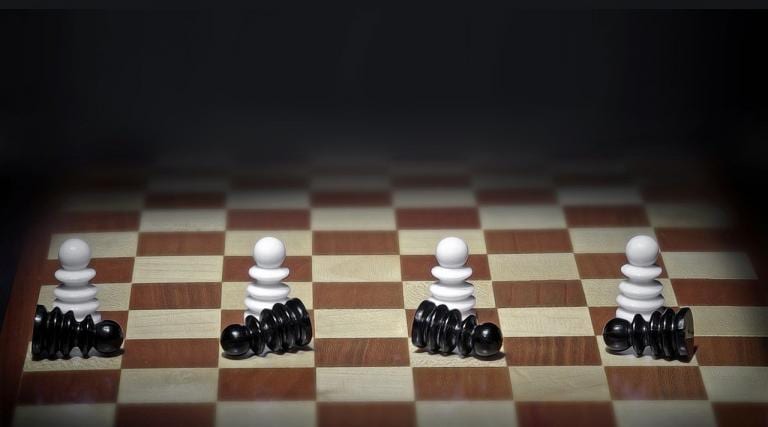Since the killing of George Floyd back in May, the country has been held hostage with mostly scripted “conversations” about racism. Some of the unscripted conversations have been constructive; the predictable ones have not.
Constructive conversations about racism acknowledge the reality that though bigotry still exists, racial discrimination – particularly against blacks – has been incontestably diminished since segregation ended roughly 60 years ago. If and when these productive conversations happen in the church, with any luck it’s with the understanding that racism and subsequent discrimination are the result of sin and should be addressed with Christian theology, not the doctrine and dogma of sociology.
Unproductive conversations about racism, usually among self-anointed anti-racists (Christians and non-Christians alike), are unconstrained, to say the least. These conversations are cynically characterized by the unwavering belief that racism persists systemically – active and organic – to thwart black development and flourishing, despite obvious progress.
For the anointed, systemic racism seeks to maintain “white supremacy.” This is self-evident for true believers. People that engage in these sorts of conversations, whether in the church or not, persistently look for confirmation of racism’s tenacity. And if one diligently looks for racism long enough, one is going to find it.
Writing on Patheos, Jackson Wu suggests that racism has been found – and is rooted in the idea of individualism. He says,
Individualism is a key value in American white culture…American lore teaches children to “go it alone,” rebel against “the system,” and determine their own future without accepting handouts from others. Emphasis is laid on individual rights and responsibility.
One’s differences dictate a person’s identity more than what they share in common with others. In short, Americans (especially white Americans) tend to see themselves apart from social groups.
Who knew that teaching people to reject dependency and to do what is possible to control their own destinies is a value of “American white culture”?
How is individualism unambiguously related to race and racism? Wu, citing Robin DiAngelo’s essay, “Why Can’t We All Just Be Individuals?” says,
[T]he Discourse of Individualism, rather than ameliorating racism, actually functions to obscure and maintain racism’s manifestation in our lives…The Discourse of Individualism is a specific set of ideas, words, symbols, and metaphors –– a storyline or narrative–– that creates, communicates, reproduces, and reinforces the concept that each of us is unique individuals and that our group memberships, such as race, class, or gender, are not important or relevant to our opportunities (emphasis his).
Continuing in his own words, Wu says,
In many of the ongoing discussions about race, people talk past each other because they conceive of identity in different ways. For those in America’s white culture, individualism grounds how they assess the problem of racism.
However, a collectivist mindset informs the arguments of many people in marginalized groups. In other words, non-whites understand better than whites that we all are (and have been) members of various social groups. These communities and subcultures have shaped how we see the world and contribute to our success and failures…
To demonstrate how pervasive the idea of racial individualism is, look at the picture below. This is on the website of National Museum of African American History & Culture. It’s accompanied by a video from the United Methodist Church General Commission on Religion and Race (GCoRR) featuring Robin DiAngelo, the author of White Fragility, discussing the deconstruction of white privilege. This is essential for those who advocate anti-Christian doctrines of critical race theory and anti racism.
Taking Wu’s thoughts altogether, I think he misses a few critical points.
Though America has its own strain of individualism, it’s not unique to America; it’s a trait of Western civilization. Thank God for that. That characteristic was essential to the country’s foundational documents, including the prosperity and eventual freedom it has afforded its citizens, including innumerable beneficiaries worldwide.
Prioritizing self-sufficiency and self-determination don’t mean an outright refusal or rejection of help along the way. It is a way to prepare people against the contingency of support. The possibility always exists that help may not come and if so, may not be enough. Developing the tools and values associated with individualism creates a sense of resourcefulness and fortitude to succeed at the tasks that one aspires.
In the period immediately following the civil rights era, black leaders encouraged American blacks to display self-determinism rather than waiting for and depending on interventionism. The idea was that in doing so, blacks would prove to the country a semblance of equal ability.
In our contemporary context, some blacks still argue for self-determination and self-sufficiency – individualism – as guardians against excessive reliance on others or the government. These qualities work to augment human dignity–opposed to being ill-equipped and suffering dependency, which sabotages self-esteem. Does condemning individualism as an extension of whiteness and “racism” apply to blacks when they vouch for independence? Or, is it reserved only for white people?
We all conceive of identities in various ways – it’s one of the blessings of being human.
But Wu’s contention that people choose the sin of white individualism – at the expense of group identity – is wrong and goes against reality.
Joining multiple cultural institutions, people frequently include group membership as part of their identities. Many people acknowledge their group identity as Christians – members of their local churches but also members of the multinational family of God. Others see themselves as progressives, conservatives, servicemen and women; Muslims, atheists, Freemasons, activists– even anti-racists and critical race theorists. Individualism and group identity are both/and, not either or.
Wu selectively condemns white Americans for not collectively self-identifying as “white,” therefore rejecting the secular trinitarian mindset of race, gender and class that sees racism – and its eradication – as systemic or institutional.
If individualism is a form of racism, consciously collectivizing as “white” would be considered racism, too.
Racially collectivizing would only extend to white Americans the sin and guilt of their cultural forebearers. Blame would predictably be cast for industriously attempting to re-institute the ghost of white supremacy by re-victimizing blacks.
Both individualism and willful corporate identity appear to be losing propositions for white Americans – they’re “racist” either way.
I support constructive Christian conversations on how to effectively mitigate the vestiges of racism and churches should lead the way. But Wu’s position is neither constructive nor Christian.






Comment by Robert Hulse on July 17, 2020 at 11:13 am
Sadly, this kind of shallow rejoinder is typical of the IRD community.
Let’s start with his “conclusion” and work backwards.
Green claims…
“I support constructive Christian conversations on how to effectively mitigate the vestiges of racism and churches should lead the way. But Wu’s position is neither constructive nor Christian.”
However, he offers nothing in the way of alternative, more “constructive” (as he views “constructive”) dialogue. His words are aimed and deconstructing the argument of Jackson Wu, with passing reference to Robin DiAngelo (has he read the book?) and a display in a national museum. Nothing he writes suggest any alternative “constructive” frameworks for conversation (except a decidedly secular quip about how we all assess identity in different ways – without explanation or further discussion). There are no gospel-oriented or theologically-based notions in his writing at all.
With respect to the particular claims made by Wu, it is clear that Green doesn’t like critiques of individualism (without actually rebutting them). He doesn’t like critiques of racial identity. He clearly believes that much progress has been made with respect to racial disparities (without supporting any of his statements with facts or data). In none of his rhetoric does he offer a gospel perspective (except to allude to a notion that if we just take care of individual “sin”, we’ll have reached the racial promised land).
If Mr. Green has better analysis or critical theory on the subject, it would be fascinating to read. This article doesn’t achieve that nor do his opinions as a “Christian and conservative” (https://twitter.com/DerryckGreen) constitute anything resembling a “constructive Christian conversation”.
Is there more or is this it? 🙂
Comment by Mike on July 18, 2020 at 9:18 am
“Is there more or is this it?”
Mr. Green adequately refuted Mr. Wu’s premise, which basically is: “White people are inherently racist”. Mr. Wu is arguing from the standpoint that, merely by being white, we are guilty of being racist, even when we make every effort to not engage in racism. We are guilty, period. This smacks of the behavior that Jesus condemned when he pronounced “Judge not, that you be not judged”. It is a classic liberal tactic. It ranks with the idea that, because my ancestors may have owned slaves two hundred years ago, now I owe reparations to the descendants of those slaves. Where is the principle that every person is responsible for his own actions? And whatever happened to the Commandment that “Thou shalt not covet”? I, for one, am tired of liberals trying to make me feel guilty for something that I did not do.
Comment by Donald on July 18, 2020 at 10:31 am
Or as Jesus said in describing the Pharisees of his day, “To what, then, can I compare the men of this generation? What are they like? They are like children sitting in the marketplace and calling out to one another: ‘We played the flute for you, and you did not dance; we sang a dirge, and you did not weep.’ For John the Baptist came neither eating bread nor drinking wine, and you say, ‘He has a demon!’ The Son of Man came eating and drinking, and you say, ‘Look at this glutton and drunkard, a friend of tax collectors and sinners!’ (Luke 7:31-34 / Matthew 11:16-19).
Comment by Rebecca on July 17, 2020 at 10:59 pm
Thank you for pointing out that critical race theory is
anti-Christian. And the attack on Western Civilization is also anti-Christian. I’ve read books by F. Engels and V. I. Lenin, and they attacked Western Civilization in exactly the same way as the protestors do today. Marxists absolutely hate Christianity because it stands against totalitarianism. The Protestants in Europe called the royalty tyrants, and were the first to be for individual freedom after reading the Bible and understanding how men are to live under God. Marx’s utopia is regression, not progression.
Comment by Jeff on July 18, 2020 at 2:33 pm
>> Individualism and group identity are both/and, not either or.
^^^^^^^^ THIS. ^^^^^^^^^
Thank you Brother Green for stating it so clearly — very useful!
INDIVIDUALLY we’re saved by grace, through faith… to serve the Lord’s CORPORATE construct, His Church. His Spirit gives testimony to each of our INDIVIDUAL spirits that we are His children — called to serve “one body (corpus)” (Eph 4:1-6).
THOSE are our rightful identities, and it drives the cultural marxists nuts when we claim them, rather than the manipulative IDs the marxists demand that we adopt. Weep and gnash those teeth, leftists! We’re seeing through your lies.
I confess this critical theory/cultural Marxism whirlwind we’re struggling with caught me out in the open, totally unaware, and I am doing my best to get a handle on understanding it. You are doing the Lord’s work when you help us clarify and articulate our true identity. I am grateful! May GOD anoint the work of your hands with His favor, to His glory.
Jeff
Comment by Jackson Wu on October 10, 2020 at 12:31 am
Actually, I don’t argue that “ racism …is rooted in the idea of individualism.” Rather, I suggest that individualism fosters, perpetuates, and protects racism. In other words, it waters racism it’s not the root itself.